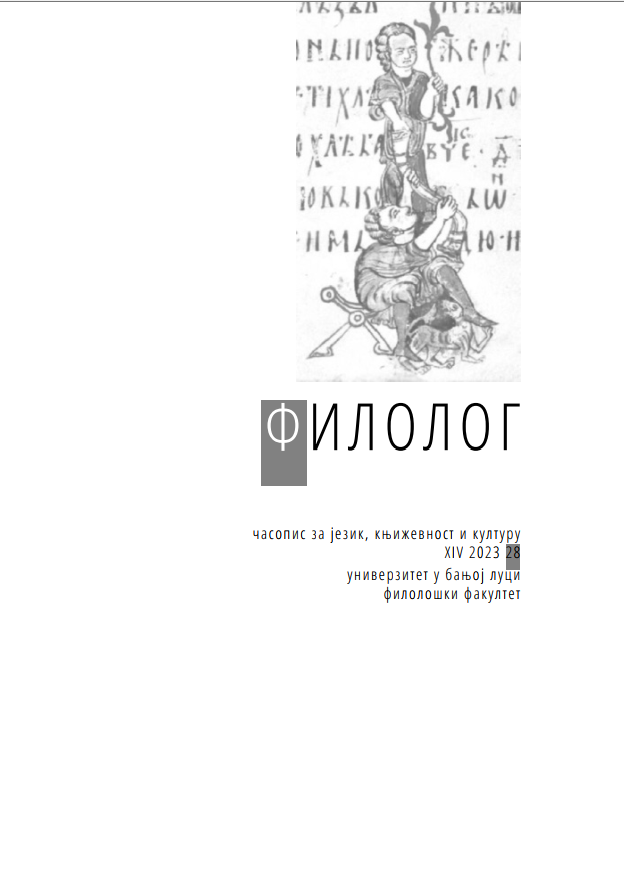MIRRORING CONTEMPORARY SOCIETY: CONSUMERIST SOCIETY, MEDIA AND SIMULATED REALITY IN DON DELILLO’S NOVEL WHITE NOISE
DOI :
https://doi.org/10.21618/fil2328343bMots-clés :
Don DeLillo, White noise, media, television, consumerist society, consumerism, simulated reality.Résumé
Don DeLillo's novel White Noise deals with the complex relationship between popular culture, media, and consumerism and the ways in which they shape the characters' perception of reality. The main character, Jack Gladney, is a consumerist academic who is heavily influenced by the mass media, and his obsession with images of disaster and death, which are constantly shown in the media, shapes his perception of the world. Similarly, his wife Babette becomes obsessed with consumer products and loses touch with the natural world around her. The novel also explores how constant consumption of television content can create a sense of disconnection from reality and how it can create a sense of hyperreality, where the lines between reality and simulation are blurred. Also, through the character of Jack Gladney, DeLillo emphasises a society in which individuals are defined by what they own and consume. Gladney’s preoccupation with consumer goods reflects a society in which consumption determines a person’s value, and the novel points to the dangers of this trend and the need to return to people’s connection with reality and nature. DeLillo emphasises the power of media images to shape individual understanding of the world and the need to be critical of the information people consume, as well as to reconnect with reality and nature.
Références
Baudrillard, J. (1983) Simulations, New York, Semiotext(e).
Baudrillard, J. (1998) The Consumer Society: Myths and Structures, Nothingam, Nothingam Trent University.
Bawer, B. (1985) Don Delillo's America, New Criterion, 3, 34–42.
Bodrijar, Ž. (1991) Simulakrum i simulacija, Novi Sad, Svetovi.
Belk, R. W. (1988) Possessions and the extended self, Journal of Consumer Research, XV, 2, 139–168.
Da Cunha Lewin, K. & Ward, K. (2019) Introduction: A trick of the light: Don DeLillo in the twenty-first century, Don DeLillo: Contemporary Critical Perspectives, Da Cunha Lewin, K. & Ward, K. (eds), London, New York, Bloomsbury Academic, 1–16.
DeLillo, D. (2005) Bijela buka, prev. Ljubo Pauzin, Lunapark, Zagreb.
DeLillo, D. (1985) White Noise, New York, Viking Press.
DePietro, T. (1985) Laughing through the Malls, Commonweal, 219–20.
Disch, T. M. (1985) Maximum Exposure, Nation, 120–21.
Duvall, J. N. (2003) The (Super)Marketplace of Images: Television as Unmediated Mediation in DeLillo’s White Noise, Don DeLillo’s White Noise, Bloom, H. (ed.), Broomall, PA, Chelsea House Publishers, 169–194.
Featherstone, M. (2007) Consumer culture and postmodernism, New York: Sage.
Firat, F. A. & Venkatesh, A. (1993), Postmodernity: The age of marketing, International Journal of Research in Marketing, X, 3, 227–249.
Fiske, J. (1991) Reading the Popular, London and New York, Routledge.
Fisk, Dž. (2001) Popularna kultura, prev. Zoran Paunović, Beograd, Clio.
Hall, S. (1997) Representation: Cultural representations and signifying practices. New York, Sage.
Johnson, D. (1985) Conspirators [Review of White Noise, by Don Delillo], New York Review of Books, 6–7.
Kavadlo, J. (2004) Don DeLillo: Balance at the Edge of Belief. New York, Peter Lang.
LeClair, T. (1987) In the Loop: Don DeLillo and the Systems Novel, Urbana and Chicago, University of Illinois Press.
Lehmann-Haupt, C. (1985) Books of the Times, New York Times, C18.
Manning, J. & Adams, T. E. (2015) Popular culture studies and autoethnography: An essay on method, The Popular Culture Studies Journal, III, 187–221.
McInerney, J. (1985) Midwestern Wasteland, New Republic, 36–39.
Middleton, R. (ed.) (2000) Reading Pop: Approaches to textual analysis in popular music, USA, Oxford University Press.
O’Donnell, P. (2008) Underworld, The Cambridge companion to Don DeLillo, Duvall, J. N. (ed.), Cambridge, New York, etc., Cambridge University Press, pp. 108–122.
Orr, L. (2003) Don DeLillo's White Noise: A Reader's Guide, New York, London, Bloomsbury Publishing.
Phillips, J. A. (1985) Crowding Out Death, New York Times Book Review, l, 30–31.
Phillips, R. (1985) Review of White Noise, America, 16.
Ritzer, G. (1993) The McDonaldization of Society, Thousand Oaks, Pine Forge Press.
Ruppersburg, H. & Engles, T. (2000) Introduction. In: Critical Essays on Don DeLillo, Ruppersburg, H. & Engles, T. (eds.), New York, G. K. Hall & Co., pp. 1–27.
Schor, J. B. (1998) The Overspent American: Why We Want What We Don't Need. New York, Harper Perennial.
Slater, D. (1999) Consumer culture and modernity. Boston, Wiley–Blackwell.
Storey, J. (2018) Cultural theory and popular culture: An introduction. Milton Park, Abingdon, Routledge.
Téléchargements
Publiée
Comment citer
Numéro
Rubrique
Licence

Ce travail est disponible sous licence Creative Commons Attribution - Pas d'Utilisation Commerciale - Pas de Modification 4.0 International.








